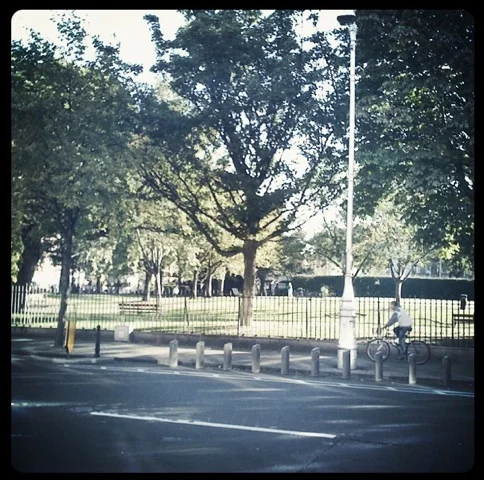Five Questions for... Marcel Krueger
/(above: Mountjoy Square, Dublin)
The next in our series of short interviews with the editors and contributors to Elsewhere: A Journal of Place is with Books Editor Marcel Krueger...
What does home mean to you?
I don't harbour strong feelings for home, as in the place I was born. Maybe I just don’t like the idea that a random place of origin has any determination over my life. At the moment I am lucky insofar that I call three places “home”: one is Berlin, where I work and live, the other is Cologne where my wife lives and we share an apartment, and the third is Dublin where I used to live for seven years and that I visit every two to three months. Of the three, Dublin is the hometown of my own making, the place I decided that it fits me best in this world. I might become unfaithful to her the moment I discover another place that suits me better, even though I wonder if such a place exists.
In general, home to me always is more connected with other people and the places where I feel most accepted and happy, and that acceptance is not necessarily a human one - places can make you feel welcome as well.
Where is your favourite place?
Mountjoy Square on the Dublin Northside. I used to live just around the corner in a Georgian building from 1793, in the former servant quarters in an annexe in the backyard. It was a place surrounded by the rising grey and brown backsides of other Georgian houses, and some stray cats from the empty house down the lane were always playing in my small yard. The apartment was a tiny but nice place with wooden flooring and a low ceiling with roof-lights, and most days I could hear the rain and the footsteps of the cats on the roof when I was sitting at my desk.
I always took the bus from Mountjoy Square, and I still love standing there in the morning, preferably in autumn, and see the impressive yet worn-down buildings lining the square wake up as my neighbours walk their dogs and the drug addicts from the nearby estate huddle on one of the benches as Polish joggers make their rounds… and all and everyone are swathed in that beautiful Dublin autumn morning light.
What is beyond your front door?
Right now: four lanes of Berlin traffic, behind that a large square with a football pitch, a playground and ghostly trees devoid of leaves. There is a large red-brick church from 1893 currently used by a group of non-denominational African believers. Opposite the church is another football pitch that the city of Berlin has rented out to a group of urban gardeners and which at the moment is filled with sad empty elevated flower beds. At the same spot once stood the Reichsmütterschule, the Imperial Mother’s School of Nazi Germany, where the Nazis trained young women in keeping a household while at the same time indoctrinating them with brown thoughts.
What place would you most like to visit?
The Faroe Islands and Greenland. I always prefer the north and the cold as opposed to sun and beach life, and as I’ve visited Iceland quite regularly in the past this would be the next step for me. While I am a city-dweller through and through, I sometimes feel the urge to flee and hide somewhere remote. Preferably where Vikings or Irish monks hid before me.
What are you reading/watching/looking at right now?
A collection of essays and journalism by my favorite German author Jörg Fauser. Fauser was a prolific novelist, essayist and journalist born in 1944 who broke off his academic studies to work and travel, with longer stays in Istanbul and London, working as a casual labourer, airport baggage worker and night watchman. He also supported himself as a journalist, and was acquainted with Charles Bukowski (who wrote a poem about Jörg when he heard of his death). He developed a heroin habit which he was able to shed at the age of 30, and spent much of the rest of his working life dealing with an alcohol addiction. Fauser was heavily influenced by Beat literature and American crime stories, producing three successful novels, including 'Der Schneemann’ (The Snowman), and a plethora of short stories. He was always shunned by the German literary establishment, and like his contemporary Hunter S. Thompson he was also deeply disillusioned by the failure of the ideals of the 1960s, and his writing remained that of a driven man searching for something that is always just a few inches from his grasp. He died in 1987, run over by a truck after a night of whoring and drinking.
Marcel is a writer and translator who divides his time between Berlin, Dublin and Cologne. A contributing editor to Sonic Iceland and a Berlin Spotter for Spotted by Locals, Marcel's work has also appeared on the CNN Traveler website, in the Daily Telegraph and Slow Travel Berlin, and he is currently working on a Literary Guide to Berlin.


